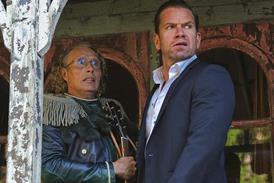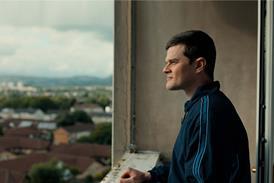Dir: Pablo Reyero. Argentina/France. 2003. 86mins
A long time in gestation - and picked for the Un Certain Regard section at Cannes at the last minute - Pablo Reyero's first fiction feature is sure to attract further festival fixtures, but will struggle to make it onto the commercial circuit beyond its Arte slot. A loser's tale through and through, its desolate image of today's Argentina offers no redeeming features whatsoever, with crime and politics interwoven, and police corruption thrown in to make the lawless state of the country perfectly clear. Relying on mood and atmosphere more than he does on his plot, Reyero offers the audience a cast of thoroughly unpleasant characters whose excuses for being so may be plausible, but are not sufficient to make them palatable.
Two brothers, Javier and Wendy - a transsexual - plan to hijack a shipment of narcotics, and Javier's girlfriend, Nora, goes along with them for lack of anything better to do. After the heist, the trio take refuge in the rundown beach house belonging to Rodolfo and Mercedes, the two brothers' parents, a hapless couple who steal their neighbours' cattle and pigs to feed themselves.
Each of these five has their own cross to bear - Javier is a hopeless addict and drug-dealer who has screwed up in Argentina and now hopes for another break in Paraguay, if he can cross the border. Wendy is fading away, hopelessly fighting Aids with medicine that has no effect.
Nora is angry for being involved in an escapade she dislikes intensely; it turns out later she is pregnant and dreams of happier times with her baby. Rodolfo had been in jail for years, his life is ruined, but he is still proud of having never snitched on his pals, and Mercedes would like nothing better than to escape from the derelict beach house that her husband claims he will one day turn into a tourist attraction.
The relations between these characters is disturbingly tense: Nora and Wendy hating each other while trying to win Javier over to their side; Rodolfo and Mercedes tearing each other apart. Meanwhile, the intemperate weather, the dark skies and the troubled sea ominously hem them in. With the underworld on their tracks, intent on punishing them for breaking ranks, there is not much they can do but await their imminent demise.
No storyteller as such, and not much of an actor's director either, Reyero feeds mostly on the anguish of this bunch of people clinging to each other out of sheer desperation, with drugs as their only relief from a life that no longer holds any real promise for them.
Shot in an almost documentary fashion, Reyero's film alternates between the grainy sequences of characters colliding with each other and striking shots of windswept beaches that enhance the mood.
To his credit, Reyero insinuates - without ever underlining the fact - that Rodolfo's prison years may have been down to his politics, that Nora's father may number among the countless desaparecidos (those who 'disappeared' under the rule of the military junta in the 1970s and 1980s), whose graves have never been identified, and that criminals are freely using the police to settle scores between themselves, thus adding a political angle to a picture that might, otherwise, be considered just another shaky attempt at a film noir on Latin American marginals.
Prod cos: Oceano Films, Incaa Argentina, F For Film, France For Arte Fiction Unit
Int'l sales: F For Film
Exec prod: Javier Del Pino
Scr: Pablo Reyero
Cinematography: Marcelo Iaccarino, Mariano Cuneo
Ed: Fabio Pallero
Prod des: Maria Ibanez, Marcela Albacete
Sound: Abel Tortorelli
Main cast: Letizia Lestido, Luciano Suardi, Humberto Tortonese, Mario Paolucci, Silvia Bayle















![[Clockwise from top left]: Paul Thomas Anderson, Chloe Zhao, Ryan Coogler, Park Chan-wook](https://d1nslcd7m2225b.cloudfront.net/Pictures/274x183/9/0/0/1467900_writerdirectors_192733.jpg)


No comments yet